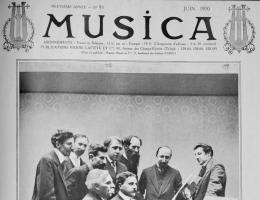
André CAPLET
1878 - 1925
Conductor, Composer
An exceptionally gifted musician, André Caplet worked as a pianist at the Folies-Bergères in Le Havre from the age of twelve. He studied harmony, counterpoint and piano under Henry Woollett, then entered the Paris Conservatoire in 1896 to study harmony under Leroux, composition under Lenepveu and accompaniment under Vidal. He was awarded the Prix de Rome in 1901, on his first attempt, for his cantata Myrrha. At the same time as his admission to the Conservatoire, Caplet had begun an orchestral conducting career, replacing Leroux at the Théâtre de la Porte Saint-Martin and becoming assistant conductor of the Colonne orchestra. Between 1910 and 1914, he spent six months of the year as conductor of the Boston Opera Company; he also conducted the orchestra at the Paris Opera House. From 1907, Caplet became a close friend of Debussy’s. He read over Debussy’s scores before publication, orchestrated some of his piano works and helped with the original orchestration of the Martyre de Saint-Sébastien, whose first performance he conducted in 1911. Debussy was full of praise for the younger man’s qualities, and for his music, whose improvisatory feel and harmonic world were similar to his own. Caplet enlisted in the army in 1914. Returning wounded from the war, he abandoned his conducting career and devoted himself to composition. He particularly favoured chamber music, but his catalogue also contains orchestral and choral pieces. His Catholic mysticism found an outlet in his Messe à trois voix (1920) or the Miroir de Jésus (1923). His masterpiece is probably the Conte fantastique for harp and string quartet, after Edgar Poe.
Scientific publications
Publication













